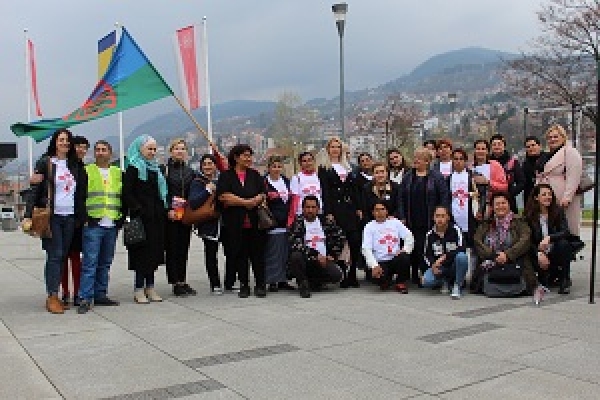The Platform is a document that contains an analysis of the situation of Roma women and includes a set of recommendations that guide the various key actors in the formulation of policies, strategies and plans in order to adequately address the needs of Roma women as a particularly marginalized group of women and anticipate measures and action plans that will contribute to the advancement rights and status of Roma women in Bosnia and Herzegovina.
The process of gathering information and creating the Platform is led by the Association of Roma Women "Bolja buducnost" from Tuzla in cooperation with the Roma women's network "Uspjeh. Active and participation in creating measures for the improving the status and rights of Roma women in B&H, as well as supporting the process of developing this Platform, was provided by the Ministry of Human Rights and Refugees of B&H, Agency for Gender Equality of B&H, Gender Center of the Federation of B&H, Women's Network B&H, Association for Promotion of Roma Education Otaharin , Unwomen, OAK foundation, Kvinna till Kvinna, CARE INTERNATIONAL Balkans.
As B&H enters the drafting phase to address Roma employment, housing and health care issues 2020-2024 the Platform will serve to address the needs and priorities of Roma women as well as measures that will led to improving the position of Roma women.
The Platform focuses on the gaps in strategies, plans and policies that have emerged in previous periods due to the inadequate inclusion of the needs and priorities of Roma women in action plans at central and local level, strategies and bodies representing national minorities and Roma in BiH.
The Platform is an advocacy instrument designed to advocate for the rights of Roma women at the domestic and international levels, and a document that takes into account anti-Gypsyism, discrimination, prejudice and gaps that the state commits to Roma women. It seeks to recognise, monitor and prevent anti-Gypsyism in BiH. Through its gender analysis, the platform first looks at the situation of Roma women in BiH, identifies obstacles they face in their daily lives, both in Roma communities and in society, and through their efforts to exercise their rights. The second part of the Platform provides a brief analysis of the situation for Roma women in the following areas: housing, employment, health and social care, education, political and social participation, gender-based violence and domestic violence, juvenile marriage and relationships, discrimination and combating anti-Gypsyism .
After gender analysis, each of these areas contains recommendations for measures that, in the opinion and experience of the relevant actors involved in the creation of this Platform, should include the following action plan, as well as all strategies and plans to achieve greater gender equality for Roma women and to contribute to the improvement of status and rights of Roma women in B&H.

